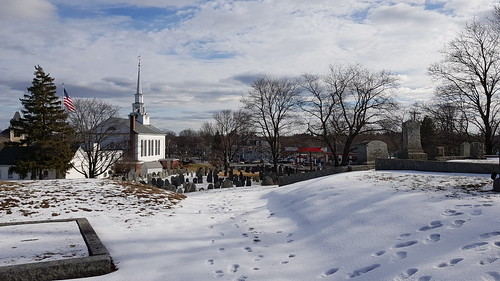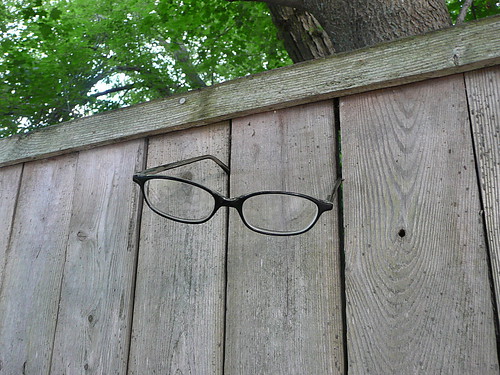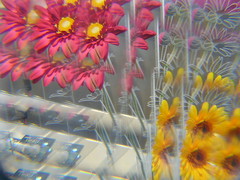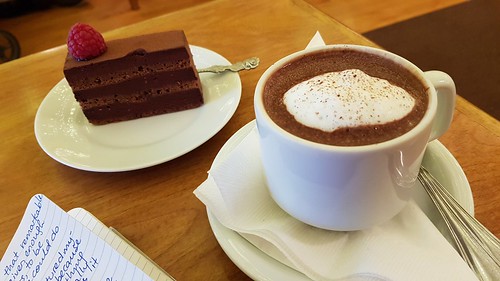
Last weekend I turned 50, a milestone I somehow never thought I’d reach. Turning 50 isn’t a remarkable task–given enough time, anyone could do it–but somehow I never imagined it happening to me.
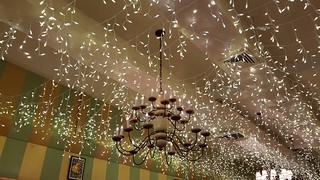
When I was younger, being 50 is something I never (literally) pictured. As a child, I could readily envision myself in high school, college, and young adulthood. I could picture myself in my 20s and 30s, when I imagined I’d have long, disheveled hair and legs that would stride tirelessly through woods and streams, stomping fearlessly through mud and briars. But I never imagined myself as middle-aged, settled, and settling. Back then, I never imagined I’d transform into a gray-haired, thick-middled woman in a pink coat and gray beret, the kind of unremarkable older woman you might pass on the street without really seeing. I could if I really tried imagine myself as a white-haired and wiry old lady, but not as gray and middling.
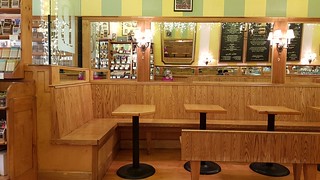
Thirty years ago when I was an undergraduate, I took a group singing class for non-music majors that I’ve since insisted was the most useful class I took in college. In that class, I had to stand in front of my peers and sing unaccompanied, including at least one opera song in Italian. This class is where I first learned about the passaggio. All singers–especially sopranos like me, my teacher said–have a low voice and a high voice, but the trickiest voice is the passaggio, the voice in the middle where the low tones in your chest meet the high falsetto in your head.
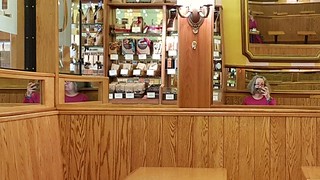
My voice teacher was a rail-thin sliver of a man, but he physically transformed when he sang, standing up taller and emitting a big, booming voice that seemed to come from the center of the earth. After alternating between his thin, unremarkable speaking voice and his rich, deep singing voice, my teacher explained that mastering the passaggio was the secret to becoming a good singer. If you weathered the passaggio, he explained, you could link your high voice to your low voice to create one seamlessly connected voice that swelled effortlessly from low to high without any squeaks, croaks, or cracks.

When you shift from low voice to high, he explained, your throat–your whole body–does all sorts of weird things. Your voice sounds squeaky and shrill. You think this voice sounds bad because it is unusual to your ear: it’s not the speaking voice you’ve grown accustomed to. Even though you’re singing from your own body–where else, exactly, could you sing–the passaggio is a place you might not ever explore.
“Put your hand on my shoulder,” my teacher would say as he sat at the piano and switched from his soft speaking voice to his infinitely rich baritone. He wanted all of us–a half dozen non-musicians in a one-credit pass/fail elective–to feel the physical change. “Your whole body is an instrument,” he’d insist, and yes, you could feel something shift in his shoulder as he went from slack-spined and insipid to upright and energized: Clark Kent transformed into Superman.

I am, at age 50, weathering a different sort of passaggio. Being 50 is physically weird. Your body becomes alien, with new aches and pains, less flexibility, and diminished energy. Fatigue becomes a kind of friend–a phenomenon you know right down to your bones–and so do disappointment and resignation. If you are a woman, your alien body will surge with heat, sweat, and restless, abundant energy as you lie abed, pondering life, the universe, and the eternally vexing question of whether you locked the back door.
Although I was (and am) an unremarkable singer, my college voice teacher did walk me through the passaggio once. Usually, he let us choose our preferred register for whatever song we decided to sing in front of the class: the whole reason I opted for this elective, after all, was to force myself to sing in front of strangers, figuring the experience of taming my nerves would be good practice for teaching. (I was right.) But occasionally, my teacher would choose a key on the piano and ask us to sing it, turning us the other way so we couldn’t see how low or high that note was.
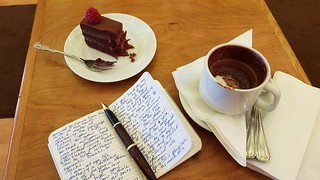
And so one day when he thought I was ready, my teacher did with me what I’d seen him do with other students: he asked me to do a warm-up exercise down low in my register, and then he gradually moved that exercise up, up, up the scale. After a half dozen steps, I started to waver, my voice feeling thin and squeaky. “If it doesn’t hurt, don’t stop,” he encouraged. “It sounds beautiful to the rest of us: keep going.” And when I reached the place where my voice finally cracked, he turned me around to the piano and showed me, there on the far right side of the keys, the impossibly high note I had reached. “If you don’t believe that’s the note you just sang,” he said, “just look at your classmates,” and indeed, they were all staring at me, amazed.
Although I never became a classical singer, what I learned from that one credit, pass/fail class was the courage it takes to stand in your own shoes, open your mouth, and trust with all your heart whatever sound comes out. At the still-strange age of 50, I’ve come to believe that in the middle of any passage, you won’t necessarily imagine what comes next; you just have to trust your body to work through its weirdness on the way to a pure, clear note.




